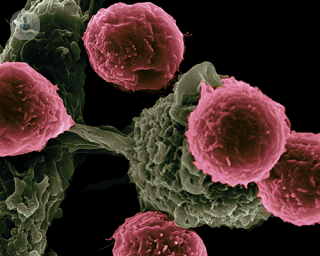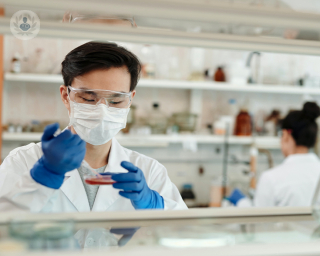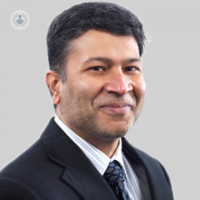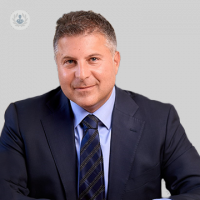What are clinical trials?
Clinical trials are medical research studies that test how scientific discoveries can be applied to patients.
The test may be on a medical product, a substance, a drug, a diagnostic technique or a therapeutic technique that aims to assess its efficacy and safety, applying it to humans. Clinical trials can also compare a new treatment to one that is already available.

What does it consist of?
Each clinical trial has a protocol or action plan that describes what will be done in the study, how it will be done, and why each part of the study is necessary.
Each trial has its own rules about who can participate, as the profiles of the participants will be specific and adapted to the type of trial. For example, some need volunteers with a certain disease, others need healthy people, and others only ask for men or women.
Why is it done?
Clinical trials are carried out in humans to clarify the clinical, pharmacological and/or pharmacodynamic effects on the body, to detect adverse reactions or to study the different changes produced in the body.
Preparation for clinical trials
To participate in a clinical trial, those in charge must study the anatomy and physiology of the person who wants to participate, since they must decide whether it is appropriate to undergo the study. Once the person is accepted as optimal for the study, a contract must be signed detailing the possible adverse effects.
How does the exam feel?
Depending on the type of clinical trial performed, the patient will experience some noticeable sensations, or they may not notice any. Testing will advise patients and researchers about the results of the trial.
06-19-2015 10-26-2023Clinical trials
Professor Hendrik Tobias Arkenau - Medical oncology
Created on: 06-19-2015
Updated on: 10-26-2023
Edited by: Sophie Kennedy
What are clinical trials?
Clinical trials are medical research studies that test how scientific discoveries can be applied to patients.
The test may be on a medical product, a substance, a drug, a diagnostic technique or a therapeutic technique that aims to assess its efficacy and safety, applying it to humans. Clinical trials can also compare a new treatment to one that is already available.

What does it consist of?
Each clinical trial has a protocol or action plan that describes what will be done in the study, how it will be done, and why each part of the study is necessary.
Each trial has its own rules about who can participate, as the profiles of the participants will be specific and adapted to the type of trial. For example, some need volunteers with a certain disease, others need healthy people, and others only ask for men or women.
Why is it done?
Clinical trials are carried out in humans to clarify the clinical, pharmacological and/or pharmacodynamic effects on the body, to detect adverse reactions or to study the different changes produced in the body.
Preparation for clinical trials
To participate in a clinical trial, those in charge must study the anatomy and physiology of the person who wants to participate, since they must decide whether it is appropriate to undergo the study. Once the person is accepted as optimal for the study, a contract must be signed detailing the possible adverse effects.
How does the exam feel?
Depending on the type of clinical trial performed, the patient will experience some noticeable sensations, or they may not notice any. Testing will advise patients and researchers about the results of the trial.


How to take part in cancer clinical trials
By Dr Mark Tuthill
2024-11-20
Cancer clinical trials can give you access to a treatment that you might not be able to get in standard care. Dr Mark Tuthill explains how to find out if you're eligible to take part in cancer clinical trials and what to expect from the initial assessment. See more


Tomorrow’s medicines today: Clinical trials for breast cancer drugs
By Professor Andrew Wardley
2024-11-05
Highly respected consultant medical oncologist and breast cancer specialist Professor Andrew Wardley shares his expertise on clinical trials for breast cancer drugs and how they have benefitted outcomes for patients over the years in this informative article. See more


What are clinical trials and how could they benefit you?
By Professor Hendrik Tobias Arkenau
2024-10-29
Deciding whether to be part of a clinical trial? Clinical trials for new cancer drugs are widely considered to be beneficial to cancer patients by potentially improving their treatment outcomes. Professor Hendrik-Tobias Arkenau, leading medical oncologist and the founding medical director of The Sarah Cannon Research Institute, explains who has access to them and how you can get involved. See more
Experts in Clinical trials
-
Professor Susana Banerjee
Medical oncologyExpert in:
- Ovarian cancer
- Endometrial cancer
- Cervical cancer
- Gynaecological cancer
- BRCA gene
- Clinical trials
-
Dr Saifee Abbas Mullamitha
Medical oncologyExpert in:
- Colorectal cancer
- Bowel cancer
- Liver cancer
- Immunotherapy
- Clinical trials
- Personalised medicine
-
Professor Hendrik Tobias Arkenau
Medical oncologyExpert in:
- Stomach cancer
- Liver cancer
- Pancreatic cancer
- Bowel cancer
- Immunotherapy
- Clinical trials
-
Dr Dionysis Papadatos-Pastos
Medical oncologyExpert in:
- Lung cancer
- Mesothelioma
- Thymoma
- Immunotherapy
- Chemotherapy
- Clinical trials
-
Dr Shivan Sivakumar
Medical oncologyExpert in:
- Pancreatic cancer
- Liver cancer
- Cholangiocarcinoma (bile duct cancer)
- Clinical trials
- Chemotherapy
- Immunotherapy
- See all

LOC at Chelsea (HCA)
LOC at Chelsea (HCA)
102 Sydney St, London
No existe teléfono en el centro.
By using the telephone number provided by TOP DOCTORS, you automatically agree to let us use your phone number for statistical and commercial purposes. For further information, read our Privacy Policy
Top Doctors

LOC at London Bridge Hospital (HCA)
LOC at London Bridge Hospital (HCA)
Private Care at Guy's, Great Maze Road, London
No existe teléfono en el centro.
By using the telephone number provided by TOP DOCTORS, you automatically agree to let us use your phone number for statistical and commercial purposes. For further information, read our Privacy Policy
Top Doctors

LOC at The Christie Private Care (HCA)
LOC at The Christie Private Care (HCA)
Wilmslow Road
No existe teléfono en el centro.
By using the telephone number provided by TOP DOCTORS, you automatically agree to let us use your phone number for statistical and commercial purposes. For further information, read our Privacy Policy
Top Doctors
-
LOC at Chelsea (HCA)
102 Sydney St, London, Central LondonExpert in:
- Cancer
- Breast Cancer
- Skin Cancer
- Prostate Cancer
- Kidney Cancer
- Thyroid cancer
-
LOC at London Bridge Hospital (HCA)
Private Care at Guy's, Great Maze Road, London, Central LondonExpert in:
- Cancer
- Intensive care
- Diagnosis of Cancer
- Diagnostic Imaging
- Chemotherapy
- Renal transplantation
-
LOC at The Christie Private Care (HCA)
Wilmslow Road, ManchesterExpert in:
- Medical Oncology
- Chemotherapy
- See all
- Most viewed diseases, medical tests, and treatments
- CAR-T cells
- Hormone therapy
- Autoimmune diseases
- Genetic testing
- Testicular ultrasound
- Nipple discharge
- Breast ultrasound
- Endovenous laser treatment (EVLA)
- Head and neck cancer
- Long Covid







